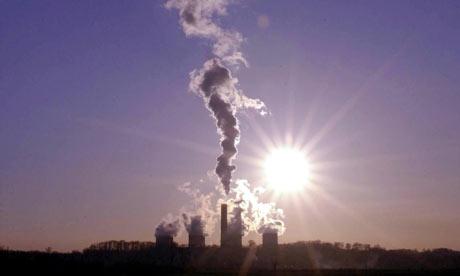Ireland proposed as carbon trading hub ahead of climate change talks in Copenhagen

Carbon emissions trading could create up to 5,000 jobs in Ireland. However, some groups say that carbon trading could trigger another financial crisis.
Addressing a seminar organised by environmental group Friends of the Earth yesterday, Paul Harris, head of energy & emissions at Bank of Ireland said there was significant potential to develop a ‘green’ IFSC, based on carbon markets, and that Ireland has a great role to play in “championing global carbon standards”.
Brian Cowen expressed similar sentiments at the opening of a research and development unit at Citi Bank’s headquarters in the IFSC last month. Cowen said he was looking at plans to establish a “green international services centre” in the IFSC in an attempt to attract companies specialising in carbon trading and other financial services.
The trade in carbon permits and credits was worth an estimated $126bn in 2008, and most emissions-trading occurs in Europe. The European Union Emission Trading System (EU ETS) is the largest multi-national, emissions trading scheme in the world. The EU operates a ‘cap and trade’ program which aims to cut CO2 output by at least 20 percent from 1990 levels by 2020. ‘Cap and trade’ is designed to limit pollution by issuing permits that allow a company to emit one metric ton of emissions. However, extra certificates can be purchased on an exchange.
US President Obama has expressed his desire to instigate a ‘cap and trade’ system in the US. This has since stalled due to the financial crisis. Nonetheless, the Norwegian-based consultancy, Point Carbon, estimate that the annual worth of the world’s carbon markets will rise to $3.1 trillion by 2020. Such a rise would make carbon the world’s largest derivatives product.
However, a report released earlier this month by ‘Friends of the Earth’ warns carbon markets have the potential to trigger another financial crisis. ‘Friends of The Earth’ argue that carbon markets have been taken over by financial organisations that are creating increasingly complex products, echoing the mismanagement and greed which initiated the current banking and credit crisis.
The report said: “The complexity of the carbon markets, and the involvement of financial speculators and complex financial products, carries a risk that carbon trading will develop into a speculative commodity bubble that could provoke a global financial failure similar in scale and nature to that brought about by the recent sub-prime mortgage crisis.”
The EU is enthusiastic that ‘cap-and-trade’ carbon trading schemes be adopted around the world. However, the establishment of a global carbon trading system suffered a damaging setback with the acknowledgement by many leaders that next month’s Copenhagen summit will not produce a legally binding agreement.
However, regardless of objections from groups such as ‘Friends of the Earth’ and the difficulties of creating a global standard for carbon trading, the development of a ‘green IFSC’ is viewed as a positive move by many, including the government, who believe that the creation of the world’s first dedicated finance centre for emissions products could create up to 5,000 jobs.
